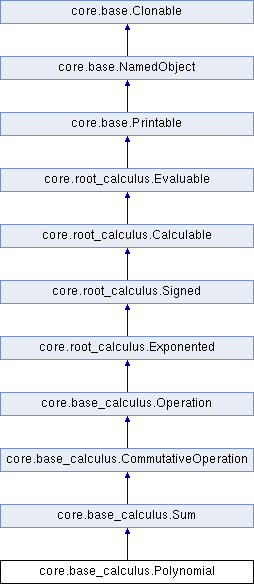A Polynomial is a Sum of Monomials, not necessarily reduced or ordered. More...

Public Member Functions | |
| def | __init__ |
| Constructor. | |
| def | get_max_degree |
| Gets the maximal degree value that can be found in thePolynomial. | |
| def | get_degree |
| Gets the real Polynomial's degree. | |
| def | dbg_str |
| Raw display of the Polynomial (debugging method) | |
Properties | |
| degree = property(get_degree, doc = 'Real degree of the Polynomial') | |
Detailed Description
A Polynomial is a Sum of Monomials, not necessarily reduced or ordered.
Definition at line 7844 of file base_calculus.py.
Constructor & Destructor Documentation
| def core.base_calculus.Polynomial.__init__ | ( | self, | |
| arg | |||
| ) |
Constructor.
- Warning:
- Might raise an UncompatibleType exception.
- Parameters:
-
arg DEFAULT|[Monomial|Polynomial]|Sum(...)|(RANDOMLY, ...) Possible arguments are : - DEFAULT : Will create a default Monomial embedded in a Polynomial
- [Monomial|Polynomial] or Sum(Monomial|Polynomial) : They'll get turned into one Polynomial
- (RANDOMLY, max_coeff, max_degree, [length|tuple(RANDOMLY, max_length)]) : The coefficients and degrees of the Polynomial will be created randomly. Limits are given by : CONSTANT_TERMS_MAXIMUM_RATIO and CONSTANT_TERMS_MINIMUM_NUMBER. The length can either be given or be let generated randomly. If the argument isn't of the kinds listed above, an exception will be raised.
- Returns:
- One instance of Polynomial
Reimplemented from core.base_calculus.Sum.
Definition at line 7871 of file base_calculus.py.
References core.base_calculus.Sum._force_inner_brackets_display, core.base_calculus.Polynomial._force_inner_brackets_display, core.base_calculus.Operation._neutral, core.base_calculus.Product._neutral, core.base_calculus.Sum._neutral, core.base_calculus.Monomial._neutral, core.base_calculus.Polynomial._neutral, core.base_calculus.CommutativeOperation.append(), core.base.Clonable.clone(), core.base_calculus.Item.dbg_str(), core.base_calculus.SquareRoot.dbg_str(), core.base_calculus.Quotient.dbg_str(), core.base_calculus.Fraction.dbg_str(), core.base_calculus.CommutativeOperation.dbg_str(), core.base_calculus.Monomial.dbg_str(), core.base_calculus.Polynomial.dbg_str(), and core.base_calculus.CommutativeOperation.info.
Referenced by core.calculus.Equation.__init__(), and core.root_calculus.Value.substitute().
Member Function Documentation
| def core.base_calculus.Polynomial.dbg_str | ( | self, | |
| options | |||
| ) |
Raw display of the Polynomial (debugging method)
- Parameters:
-
options No option available so far
- Returns:
- " [[ term0, ..., termn ]]"
Reimplemented from core.base_calculus.CommutativeOperation.
Definition at line 8070 of file base_calculus.py.
References core.base_calculus.Sum.term.
Referenced by core.base_calculus.Polynomial.__init__(), core.base_calculus.Product.expand_and_reduce_next_step(), core.base_calculus.Sum.expand_and_reduce_next_step(), core.base_calculus.Product.get_factors_list(), core.base_calculus.Product.get_factors_list_except(), core.base_calculus.Product.into_str(), core.base_calculus.Product.reduce_(), core.base_calculus.Sum.reduce_(), core.root_calculus.Signed.set_opposite_sign(), core.root_calculus.Value.set_opposite_sign(), and core.calculus.Equation.solve_next_step().
| def core.base_calculus.Polynomial.get_degree | ( | self | ) |
Gets the real Polynomial's degree.
- Returns:
- The real Polynomial's degree
Definition at line 8032 of file base_calculus.py.
References core.base_calculus.Polynomial.get_max_degree(), and core.base_calculus.Sum.term.
| def core.base_calculus.Polynomial.get_max_degree | ( | self | ) |
Gets the maximal degree value that can be found in thePolynomial.
- Returns:
- The maximal degree value that can be found in the Polynomial
Definition at line 8015 of file base_calculus.py.
References core.base_calculus.Sum.term.
Referenced by core.base_calculus.Polynomial.get_degree().
The documentation for this class was generated from the following file:
- mathmaker_dev/core/base_calculus.py
 1.7.6.1
1.7.6.1